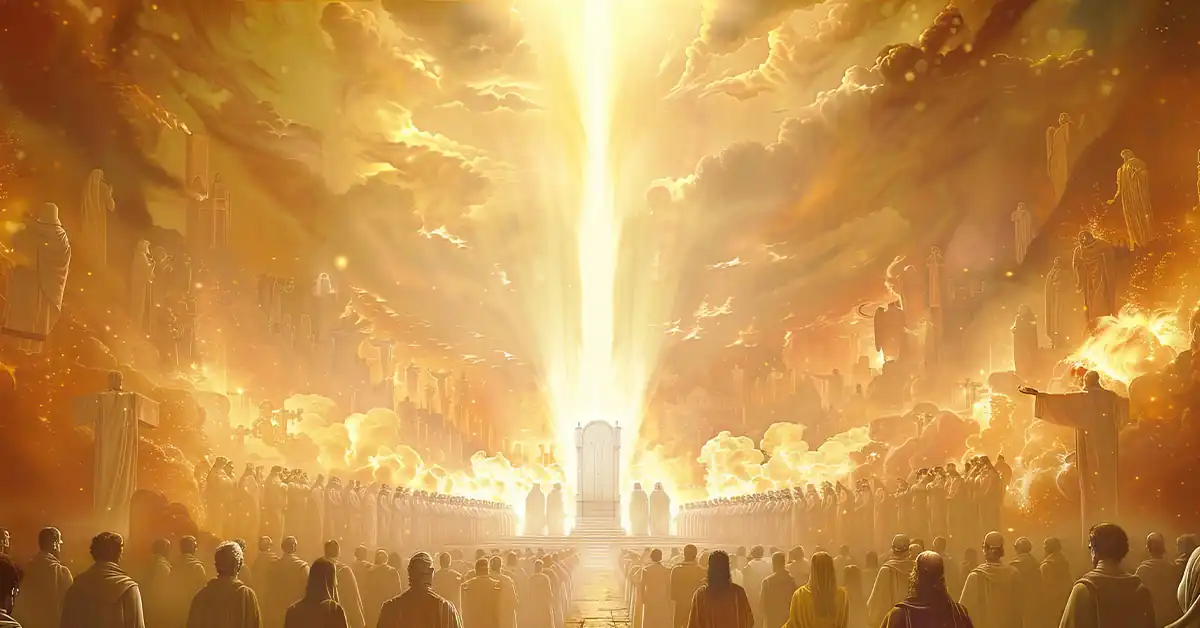Is There Really a “Final Judgment” in the Bible?

Is There Really a “Final Judgment” in the Bible?
“Final Judgment” is one of the most commonly preached concepts in Christian eschatology, but the phrase itself? Never once appears in Scripture!
Not in Hebrew.
Not in Greek.
Not in English.
Yet this invisible phrase has been used to terrify generations into believing in everlasting torment (ETC) or total annihilation, as if those are the only two outcomes of judgment. They’re not. Both are false. Both are slanders against the character of God and the finished work of Christ. And both depend on a shallow, one-dimensional misreading of what “judgment” even means in Scripture.
Let’s examine what the Bible actually teaches, and expose how theology has been built on words the Bible never even said.
The Word “Final” Isn’t There
Open your concordance. Search every passage on judgment. You’ll find:
- “The judgment”
- “The judgment seat”
- “The day of judgment”
- “God will judge the world”
But not “Final Judgment.”
That phrase is pure tradition. A label added by commentators to force a sense of finality and fear where Scripture often speaks of process, exposure, restoration, and reward.
Why Does That Matter?
Because if you assume judgment is final, as in once and for all, with no appeal, no correction, no transformation, you immediately erase the possibility of redemptive suffering, post-mortem repentance, or the biblical reality of God’s mercy enduring forever.
You are, in effect, declaring the Cross powerless after death.
But Scripture says:
“Mercy triumphs over judgment.” (James 2:13)
It doesn’t say judgment triumphs over mercy at the end of time.
Two Judgments? The Bible Requires It
Let’s state the obvious that everyone skips: Almost every Christian tradition teaches two judgments, even if they only admit one.
Here’s how it plays out:
1. Judgment at Death (Private or Immediate)
- Hebrews 9:27: “It is appointed for man to die once, and after that comes judgment.”
- Luke 16: Lazarus is comforted; the rich man is tormented immediately after death.
- Revelation 6:9–11: Disembodied souls cry out before the resurrection.
Even Protestants believe the saved go “to be with Christ” and the lost go to “hell” immediately after death.
That’s judgment #1.
2. Judgment at Resurrection (Public and Corporate)
- Revelation 20:11–15: “And I saw the dead, great and small, standing before the throne… and the dead were judged.”
- Daniel 12:2: The sleeping dead are awakened to shame or life.
- Romans 14:10: “We will all stand before the judgment seat of God.”
That’s judgment #2.
So the very people who preach against “second chances after death” are the ones who literally teach judgment twice, whether they realize it or not.
Every View of the Afterlife Requires Judgment… Then Judgment Again
Let’s compare how the major traditions understand this unavoidable double judgment:
| Phase | Roman Catholic | Eastern Orthodox | Protestant (Evangelical/Reformed) |
|---|---|---|---|
| At Death | Soul judged individually → Heaven, Hell, or Purgatory | Soul judged at “toll houses” → Paradise or Hades | Soul judged → Paradise or Hades; believers “with Christ” |
| Intermediate State | Conscious; some purified in purgatory | Conscious; awaiting resurrection | Conscious; believers in joy, unbelievers in torment |
| Resurrection | Public judgment at Great White Throne; eternal destiny confirmed | Public judgment of all mankind | Public judgment of all mankind |
| Purpose of Judgment #2 | Vindicate God’s justice; Christ glorified; eternal reward/punishment | Same | Same |
Two judgments. One at death. One after resurrection. No escaping it.
So What’s Really Going On at the “Final” Judgment?
Let’s drop the word “final” and instead ask:
What is the purpose of judgment?
The answer depends on the character of the Judge.
If the Judge is a vengeful tyrant, then judgment is punishment, no mercy, no appeal, no purpose but wrath.
If the Judge is Jesus, then judgment is exposure, correction, and restoration.
He says:
“I did not come to judge the world, but to save the world.” (John 12:47)
That’s not a cop-out. That’s the Judge telling us the purpose of judgment is salvation.
ECT and Annihilationism Collapse Under This Truth
Eternal Conscious Torment (ECT) claims:
- God’s justice requires infinite suffering.
- Mercy ends at death.
- There’s one final courtroom, then eternal screaming.
But then why is there a second judgment?
Why does Revelation say books were opened and the dead were judged “according to their works”?
Why aren’t the dead simply dumped into hell on arrival?
Why the delay?
Because the judgment after resurrection is not a final stamp of doom, it is an unveiling of every soul, followed by righteous recompense, not vindictive torture.
Annihilationism claims:
- The wicked are burned out of existence.
- God’s love is shown by putting them down like dogs.
- “Perish” means “cease to exist.”
But Revelation 20 doesn’t say that. It says they are judged.
And then?
Some are thrown into the Lake of Fire, but we are never told that the fire destroys their being.
In fact, Scripture says:
“Everyone will be salted with fire.” (Mark 9:49)
Fire purifies.
Fire refines.
Fire exposes.
Only tradition says it “destroys forever.”
Judgment Is Not the End, It’s the Revealing of What’s Been True All Along
Even now, judgment is happening.
- 1 Peter 4:17: “Judgment begins at the house of God.”
- Romans 1: God “gives them over” to their own lusts as judgment.
- John 3:19 : “This is the judgment: the Light has come into the world…”
God is always judging, not to destroy, but to bring people into truth.
Judgment doesn’t mean courtroom gavel. It means discernment, exposure, separation, and transformation.
The Lake of Fire Is Not the End Either
Despite the fear-driven sermons, the Lake of Fire is not literal torture and it is not eternal.
Revelation 20:14 calls it “the second death.”
Second doesn’t just mean sequence, it can mean a deeper kind of death.
Not obliteration. Not endless torture. But an intensified experience of alienation from God, to bring repentance.
In other words:
Those not saved in this life enter a life of death, just as the “unsaved” are called dead in trespasses even now (Ephesians 2:1).
But death doesn’t have the final word.
Revelation 21:4 promises:
“Death shall be no more.”
Universal Reconciliation Is the Only View That Honors the Whole Story
Unlike ECT or Annihilationism, Universal Reconciliation affirms:
- God’s judgments are true and just (Romans 2:2), but not vindictive.
- Every knee will bow and every tongue confess, not by force, but by revelation (Philippians 2:10–11).
- The Cross is sufficient, not just for some, but for all (1 John 2:2).
- The Lake of Fire is redemptive, a baptism of truth for those who refused it in life.
- No one escapes judgment, but judgment is not escape-proof love.
Final Judgment? No. Ongoing Justice.
The term “Final Judgment” is a manmade theological lid slammed over the story of God.
But the truth is greater:
- Judgment is now.
- Judgment continues.
- And judgment ends in restoration.
It is not a “final sentence.” It is the final unveiling of the One who said:
“Behold, I make all things new.” (Revelation 21:5)
- 09/03/2025
- WRITE A COMMENT
Recent Posts
- The Eternal False Translation: How Aionios Was Corrupted Into Eternal
- The Rich Man and Lazarus
- Does Grace Last Forever?
- His Love Never Fails
- Love and Forgive Your Enemies
- His Mercy Endures Forever
- Scriptures That Teach Universal Reconciliation
- The Lesson of James, Peter and John
- Progressive Salvation is Biblical!
- The Gates Never Shut!


